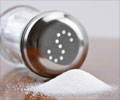A low salt diet can help manage diabetes by controlling blood pressure.

Watching Salt When You Have Diabetes
Go to source)
High Salt Diet Worsens Diabetes Risk
According to Dr. Praveen Kumar Kulkarni, Senior Consultant Internal Medicine Specialist, KIMS Hospitals, one of the primary concerns with excessive salt consumption for people with diabetes is its impact on blood pressure. “Diabetes already places individuals at an increased risk of developing high blood pressure (hypertension), a condition that exacerbates the long-term complications of the disease. Salt causes the body to retain water, which can raise blood pressure by increasing the volume of blood circulating through the blood vessels. Over time, this added strain on the cardiovascular system can lead to more severe health problems,” said Dr Praveen Kumar Kulkarni.‘Keep your #kidneys healthy, especially if you have #diabetes. Limit #saltintake to reduce strain on your kidneys. #diabetesawareness #healthyeating #kidneyhealth’





“Hypertension is a common and serious complication of diabetes. It heightens the risk of heart disease, stroke, and kidney damage, all of which are already elevated for individuals with diabetes,” he added. Dr. G. Sandeep Reddy, Consultant endocrinologist, Kamineni Hospitals pointed out that the American Heart Association (AHA) recommends that individuals with diabetes or high blood pressure aim to limit their sodium intake to not more than 1,500 milligrams per day. “This can help manage blood pressure and lower the likelihood of life-threatening cardiovascular events. Diabetic nephropathy, or kidney damage, is another major concern for people with diabetes. Over time, elevated blood sugar levels can damage the kidneys' ability to filter waste and fluids from the blood,” he explained.
“When the kidneys are already compromised by diabetes, the added burden of processing high levels of salt can accelerate kidney damage, leading to chronic kidney disease (CKD) or even kidney failure. Kidney disease is one of the leading causes of death for people with diabetes. By cutting back on salt, individuals can help protect kidney function and reduce the risk of more severe kidney-related complications,” said Dr. Sandeep.
Dr. Usha Rani, General medicine senior consultant and Diabetes management, at Aster Prime Hospital believes that the risk of heart disease and stroke is significantly higher in people with diabetes due to factors like high blood pressure, poor circulation, and nerve damage.
“Diabetics have thickened blood vessels and increased the likelihood of arterial blockages that can result in heart attacks or strokes. This risk is even greater for those with both diabetes and high blood pressure. Reducing salt is essential for cardiovascular health and lowering the risk of heart disease and stroke,” she said. Speaking about associated risks, Dr Namburi Anil Kumar, Senior Consultant – Internal Medicine & Diabetologist, SLG Hospitals stated that the daily requirement of salt is 5gm per day which is just under a teaspoon.
Advertisement
He believes that by reducing salt consumption, people with diabetes can minimize fluid retention and protect their overall health. For those managing diabetes, reducing salt intake is an important strategy for managing blood pressure, protecting kidney function, and improving cardiovascular health. While cutting back on salt can be challenging, it’s a manageable and essential step in reducing the long-term risks associated with diabetes.
- Watching Salt When You Have Diabetes - (https://www.urmc.rochester.edu/encyclopedia/content.aspx?contenttypeid=85&contentid=P00352)















